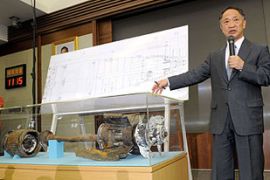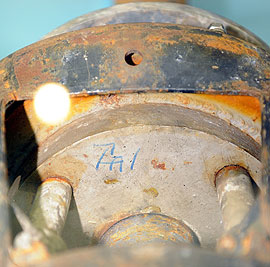US warns N Korea of consequences
Washington condemns torpedoing of South Korean patrol ship as a “serious provocation”.

Gates denied that the navy and airforce were overstretched by the US’ wars in Iraq and Afghanistan.
Mike Mullen, chairman of the US Joint Chiefs of Staff, also said that even though tensions had risen in the region, American forces in South Korea were not on a heightened state of readiness.
The US warnings follow Thursday’s announcement by an investigation team, which included experts from the US, Britain and Sweden, that there was overwhelming evidence that the explosion that sank the Cheonan warship near the disputed Yellow Sea border on March 26 was caused by a torpedo from a North Korean submarine .
The team’s report said markings in Korea’s Hangeul script were found on salvaged parts and matched markings on a stray North Korean torpedo recovered by the South seven years ago.
There has been angry reaction in Seoul and condemnation from the UN, the US and Japan.
Pyongynag said the investigation was a “sheer fabrication” and has warned of “full scale” war if new sanctions are imposed upon the country.
The White House, calling the report “objective and scientific”, strongly condemned the deadly attack.
Tighter sanctions
Steve Chao, Al Jazeera’s correspondent in the South Korean capital, said the report had major implications in terms of North-South relations, as well as the region.
 |
| Etchings on salvaged parts matched those on a North Korean torpedo recovered earlier [AFP] |
“The South Korean president is expected to approach the UN Security Council to call for tighter sanctions against the North, a call that is already seeing support from Seoul’s allies,” he said.
“In recent days the South Korean government has been presenting this evidence to a number of countries to gather support.
“We’ve already heard support from strong allies such as Australia, the US and Japan.”
The North Korean National Defence Commission, in a statement on the official news agency, said it will send its own investigators to the South to check the purported evidence.
“Our army and people will promptly react to any ‘punishment’ and ‘retaliation’ and to any ‘sanctions’ infringing upon our state interests with various forms of tough measures including an all-out war,” it said.
The commission, the North’s top decision-making body, repeated denials of involvement and threatened “all-out war” in response to any punitive measures such as sanctions.
It accused the South’s conservative government of using the incident for political gain and to worsen already chilly ties between the two Koreas, which have yet to sign a formal peace treaty to end their 1950-53 war.
‘Perfect match’
The investigation team said the Cheonan was split apart by a shockwave and bubble effect produced by the underwater explosion of a 250 kilogramme North Korean torpedo.
It said torpedo parts recovered including the propellers, propulsion motor and a steering section “perfectly match the schematics of the CHT-02D torpedo included in introductory brochures provided to foreign countries by North Korea for export purposes”.
“The evidence points overwhelmingly to the conclusion that the torpedo was fired by a North Korean submarine,” the joint civilian and military investigation team said.
“There is no other plausible explanation.”
Intelligence gathered with the South’s allies – the US, Britain and Australia – showed North Korean submarines were likely in operation near the scene of the sinking, with similar vessels of other neighbouring countries all inside their territorial waters.
“Based on all such relevant facts and classified analysis, we have reached the clear conclusion that [South Korea’s] Cheonan was sunk as a result of an external underwater explosion caused by a torpedo made in North Korea,” the report said.
The North refuses to accept the borderline drawn in the Yellow Sea, where the Cheonan went down.
The area was the scene of deadly clashes in 1999 and 2002 and of a firefight last November that left a North Korean boat in flames.